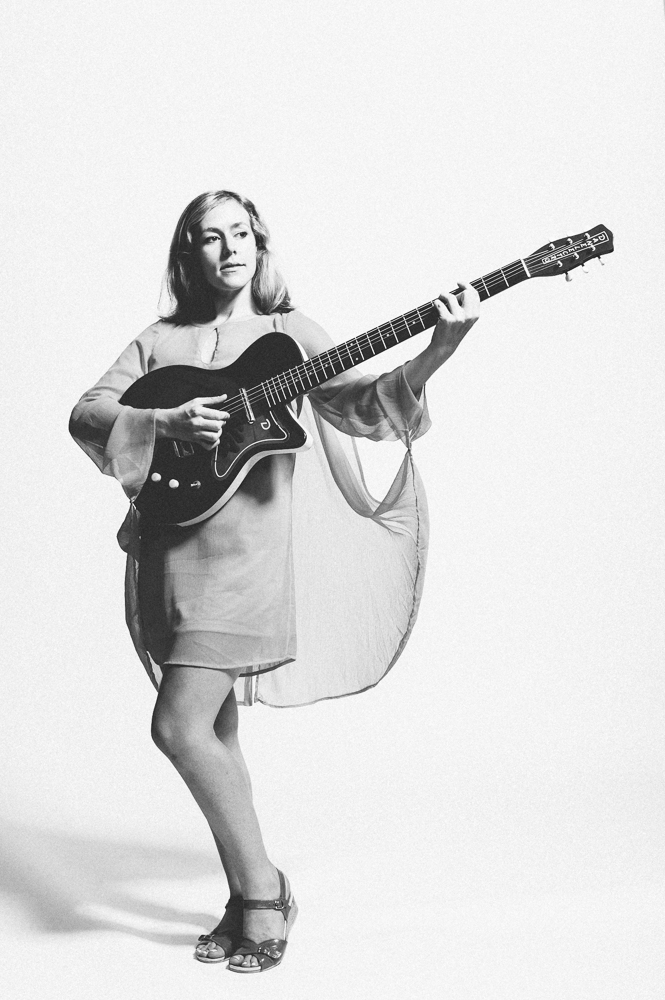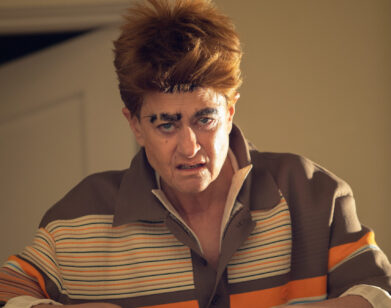Exclusive Video Premiere and Interview: ‘Name on a Matchbook,’ Springtime Carnivore

ABOVE: GRETA MORGAN IN L.A., OCTOBER 2014. PHOTO BY CARA ROBBINS.
There’s a sense of longing that runs throughout the music Springtime Carnivore makes. On her forthcoming debut under the name, singer, songwriter, and multi-instrumentalist Greta Morgan volleys back and forth between toe-tapping pop and somber folky ballads, but the overriding sentiment is something slightly wistful, like an old lover you can’t quite shake. While Morgan has moved in and out of bands since she was 15 (most recently as the guitarist for La Sera), Springtime Carnivore marks her first solo, call-all-the-shots endeavor. In Morgan’s world, hazy guitars, blown-out drums, and dreamy vocals reign supreme, and femininity and female empowerment gamely run hand-in-hand.
In the video for “Name on a Matchbook,” which we’re premiering below, director Bryce McGuire plays up Springtime Carnivore’s ’60s girl group touchstones by putting Morgan and her all-female band in front of a screaming, fainting mob of dudes. It’s a cheeky little play on that whole female groupie thing, and it suits Morgan’s vision for Springtime Carnivore to a tee.
ALY COMINGORE: So for starters, where did the name Springtime Carnivore come from?
GRETA MORGAN: [laughs] I always feel like I’m on Portlandia when I talk about the artistic process. But I was doing a free-write-like artistes do-and a coyote walked by me. This was in my mom’s backyard in Illinois. I wrote down, “When the springtime carnivores come out of the woods.” I remember thinking it was pretty cool, just the way the words answer each other, “springtime” being so fresh and new and birth-centered and “carnivore” being all destruction and survival.
COMINGORE: When did the first songs come together?
MORGAN: The first songs for this project came about two years ago. I learned how to record relatively recently, so I just started recording them as demos and putting them up online kind of anonymously. The record is basically my recordings, my demos, and then some songs I recorded with Richard Swift. My hope was just to make it cohesive enough so that people couldn’t tell who recorded what. He actually only recorded three songs on the record, though. We were planning to do the whole album together but then he got the job with the Black Keys.
COMINGORE: It sounds seamless. Did you guys work pretty well together?
MORGAN: Yeah. I just love him. I’m sure that everyone talks that way about him, but he’s one of those people who accepts his own strangeness in such a beautiful way that it allows you to accept your own strangeness too. I left [those recording sessions] with this sense of self-forgiveness or self-acceptance that I hadn’t had in my adult life. It all comes from this sublimation of laughing and goofing around and writing jokes and recording and spray-painting and making art and then going to eat Mexican food and hanging out with his kids. It didn’t come from some life-changing conversation; it was just this very natural thing that happened over the process of us working together.
COMINGORE: You played all the instruments on the record then?
MORGAN: Almost. Everything except bass.
COMINGORE: Did you start out on guitar?
MORGAN: I actually started on piano when I was really, really young. I had a really weird foundation for music, though. When I was three years old my mom’s parents both died. As a way of mourning them she played these two songs on the piano every day for years. She would always say that one song was for her mom and the other was for her dad. For her it was kind of like saying a prayer, but for me as a kid I thought music was how you talked to dead people. I had this really magical perception of what was possible through music as a child. I would ride my bike around singing gibberish thinking that all the birds in the neighborhood would follow me. I thought music could make impossible things possible.
COMINGORE: That’s kind of amazing.
MORGAN: Disney movies make little girls think anything is possible [laughs].
COMINGORE: Having played in other bands, has it felt pretty freeing to do the solo thing?
MORGAN: Definitely. I don’t know why, but I’d never been able to listen back to any of the recordings I’d done prior and enjoy it. I think the thing is, when you start out in any field, your taste is so much better than your ability to create something. If you start out listening to Bob Dylan when you’re 16, you’re not going to write a Bob Dylan song, you’re going to write your 16-year-old impression of a Bob Dylan song. I think for a long time I’ve been trying to catch up with my taste. It’s only recently that I’ve felt comfortable with it. Not that I listen to my records all the time [laughs].
COMINGORE: Do you think that confidence came from learning how to record on your own?
MORGAN: I think so. There was a very forgiving fun attitude to it: “I’ll just press record. It’s just a demo.” The funny part being that the label wanted the demos and now I’m releasing the demos. But it’s also the difference between being a girl, where you let the world tell you what to do, and being a woman, where you just fucking know what you want and you’re able to say it.
COMINGORE: What do you think of when you think of Springtime Carnivore’s aesthetic?
MORGAN: It’s like Technicolor daydream music. If I could just live in a Beach Boys demo forever, that’s where I would live. That would be my heaven. It’s like magic- hour sunset Beach Boys time. Some of the songs are more champagne-y, more effervescent, like jumping on a trampoline. And some are more like the feeling you get driving by an old lover’s house at night and just wondering what they’re doing-like longing for something that isn’t really there anymore.
COMINGORE: My first thought was that the record reminded me of some of David Lynch’s films. Which to me is one of the highest compliments you can pay anything ever.
MORGAN: Yes! I met David Lynch once. I’ve never felt more magnetically drawn to someone in my life. My arms went up and I hugged him, almost against my will. He’s just so warm. He has this really incredible presence. I think that’s why. It was like moth to a flame.
COMINGORE: You’ve amassed a good number of music videos. How does the visual side of things fit into your creative process?
MORGAN: It’s an art project, I guess. There are a few songs that I wrote with the video in mind. It also helps that my boyfriend is a director, so it’s a fun way for us to collaborate. The video for “Name On a Matchbook” is actually the first video I did with a new director. It’s kind of like a reverse Beatlemania idea where the band is all women and the crowd is all men. They’re all screaming and freaking out and crying.
COMINGORE: I like this already.
MORGAN: I’m kind of amazed nobody had done it before. I had read an article on Neko Case where she was like, “Why don’t female musicians have male groupies?” And I thought, I wonder what that would actually look like.
COMINGORE: Do you feel like you have any specific hopes or goals for the record?
MORGAN: The whole way music has affected me is that is has somehow made me feel more human at a point where I could have felt less human. We’re all on our paths of either becoming totally numb zombies who are going through the motions of life, or we’re on the path of becoming an excited, curious, awestruck human being who is feeling the blood in their veins. For me, a lot of the times that I’ve been at those crossroads there will be a record or a film, or I’ll meet a person who will pull me back to being in my body. If I could offer that to anyone in any capacity that would be the best thing ever.
COMINGORE: What were some of the films and records that had that major life affirming impact on you?
MORGAN: Oh wow, so many. Eternal Sunshine of the Spotless Mind – the film and the soundtrack – Joni Mitchell, Neil Young, Beach Boys, Raymond Carver, Paul Simon, Bob Dylan. There are three poems by William Carlos Williams that shook my world. More recently, the new Angel Olsen record. And Joanna Newsom is a constant source of inspiration to me-talk about accepting your own beautiful strangeness in a way that makes other people feel more accepting of themselves.
SPRINGTIME CARNIVORE’S SELF-TITLED DEBUT COMES OUT NOVEMBER 4 ON AUTUMN TONE RECORDS. FOR MORE, VISIT THE BAND’S WEBSITE.






